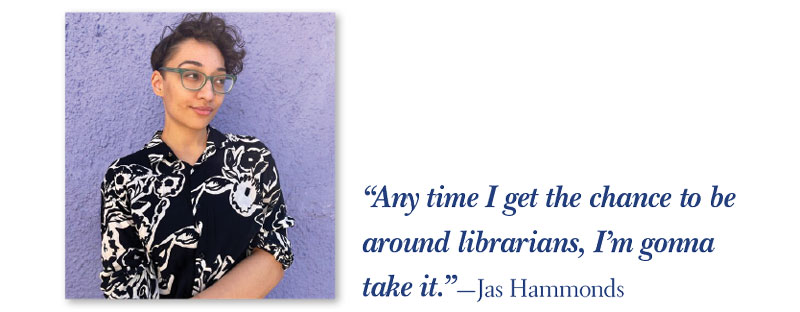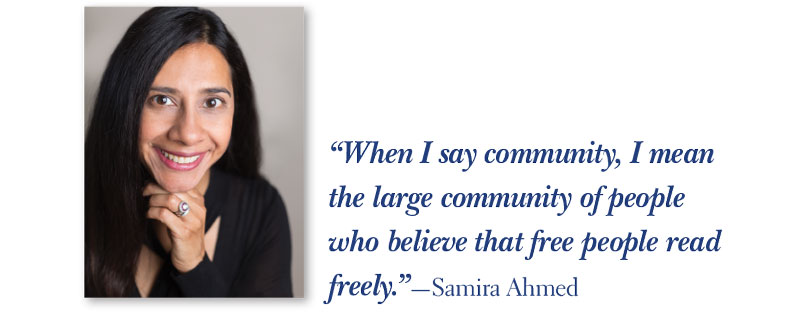Authors Head to ALA Annual with a Message for Librarians: We’ve Got Your Back
Kid lit authors attending ALA Annual are ready to support and work with embattled librarians as they manage attacks on their work. SLJ spoke with Samira Ahmed, Jas Hammonds, Angela Joy, and Eliot Schrefer about the importance of spending time with librarians at the conference discussing books, censorship, and supporting young readers.

Related ArticlesALA Annual Sessions To Note for School |
Children’s and YA authors will come to ALA Annual in Chicago to sign books and speak on panels. They will be there to accept awards and give speeches. They’ll arrive looking forward to being in community at this difficult time in publishing, education, and the fight for intellectual freedom.
“In light of the book banning, as a new author, I can say that going to ALA is not just a social or promotional thing,” says Angela Joy, author of Choosing Brave: How Mamie Till-Mobley and Emmett Till Sparked the Civil Rights Movement. “This feels like like-minded people coming together for a cause. We encourage each other in new ways.”
But they are also there to speak to and support librarians. SLJ spoke with four authors heading to ALA Annual: Joy, Samira Ahmed (Internment, Hollow Fires), Jas Hammonds (We Deserve Monuments), and Eliot Schrefer (Queer Ducks [and Other Animals]). Three of the four have had their books challenged or pulled from shelves. All belong to the LGBTQIA+ and/or BIPOC communities under attack. But they aren’t going to the conference primarily seeking support for themselves as they try to navigate the attacks on their personal lives and professional work. Instead, each expressed their desire to speak with and offer support to librarians.
“Any time I get the chance to be around librarians, I’m gonna take it,” says Hammonds. We Deserve Monuments earned Hammonds the Coretta Scott King/John Steptoe New Talent Author Award, which they are accepting in Chicago.
This is Hammonds’s second time at ALA. Last year, they enjoyed speaking with librarians about their forthcoming book. Now, they want to know what students think of the book, which schools and public libraries have it, and find ways to work together in the current environment.
“Communication between authors and publishers and librarians, in the current state of [book] bans and whatnot, is really important—for the future of YA in particular,” says Hammonds.
Ahmed brings a message for librarians to Chicago.
![Photo with Quote: “I looked her in the eyes [and] I said, ‘We’ve got your back, everybody in this room has your back.”—Angela Joy](/binaries/content/gallery/Jlibrary/2023/06/2306-uf-author-at-ala-annual-joy.jpg)
“Here’s one thing I want librarians to know: I wouldn’t normally say that I can speak for large groups, but the authors of children’s literature have their backs, and we are grateful for all that they’re doing,” she says.
Joy had the opportunity to give that message directly to a struggling librarian at a conference last year.
“I looked her in the eyes [and] I said, ‘We’ve got your back, everybody in this room has your back,” she says. “‘You need support, you call me, and I will come. If you just need a letter of encouragement, here’s my email address.’
“It’s building those bridges for people who are isolated, [who] don’t have the inherent support of a liberal school district or liberal community, so that they have resources and don’t feel like they’re the only ones out there. It’s really easy to feel like you’re alone in this fight. The loud voices are so incredibly loud. And those of us who want peace have an aversion to confrontation, so we tend to be quiet. Unfortunately, that leaves a lot of us feeling a lack of hope, a lack of strength. These conferences, I think, encourage writers, educators, librarians, and booksellers to keep moving, and that’s so important.”
Ahmed is part of a panel at ALA Annual organized by We Need Diverse Books that she hopes will find ways to address book banning as a broader community.
“When I say community, I mean the large community of people who believe that free people read freely,” says Ahmed. “I hope that includes every young adult and children’s author out there; I believe it should. That includes every librarian out there. Some librarians are under physical attack, where they are being threatened, where they are being called horrible slurs, where their livelihoods are being threatened or the families are being threatened. I wish I could be there in person at every single library in America that’s under attack and stand by the librarians. But since I can’t, this is one small way that I can let librarians know that I am grateful for them, for the work that they’re doing. And I will try to support them in whatever way that I can.”

Schrefer will be on that panel with Ahmed and is looking forward to a conversation among panelists and audience members instead of a session strictly by and about the people on stage.
“I’m so aware of the fact that they are in the trenches right now--fighting these struggles and coming up with strategies and sharing strategies for how to protect the rights of their kids to read widely and broadly and diversely,” says Schrefer, who will also be accepting his Printz Honor for Queer Ducksin Chicago. “I’m really hoping to have a discussion and a way of sharing what they’ve come up with and what, on the author side, we can offer. I’m really hoping to listen as much as speak.”
Schrefer is looking forward to the time between signings and sessions most.
“So much of the real work and growth is going to come from the hotel bars and the conversations after panels and the community and sharing and finding people who are in interesting situations and that might [be able to] help. Because that doesn’t show up in print, it’s easy to underestimate that value to conferences.”
For debut authors or librarians who are the only one in their building or district, it can be invaluable, Schrefer says.
Librarians and authors can share their situations and ask each other about what they are going through, learn they are not alone, and ideally find support and resources for managing the situation, Schrefer says.
“That’s all the human-level work, which is so important.”
Schrefer even reached out to a librarian who frequently attacks LGBTQIA+ titles on Twitter and says they are “indoctrination.” She wrote about Queer Ducks and accused Schrefer of coming after children. The author contacted the librarian, who posts anonymously, to see if she would be at ALA.
“‘If you’re going to be there, in the conference hall, we could get a coffee and I could learn a little from your perspective, and you can learn a little from mine,’” he says he wrote. “She didn’t respond.”
So far, Hammonds’s We Deserve Monuments hasn’t been included on any of the booklists being attacked, much to the author’s surprise.
“It definitely has the markers for being a title that is challenged, as [it’s by] a queer Black writer,” they say. “I just feel like the very existence of us writing stories about characters who look like us is political.”
They anticipate a coming challenge, though, and still feel the sting as groups lash out against LGBTQIA+ and BIPOC books and authors. It can be disheartening even when it’s not your work, they say.
![Photo with Quote: “I’m so aware of the fact that [librarians] are in the trenches right now—fighting these struggles, coming up with strategies and sharing strategies for how to protect the rights of their kids to read widely and broadly and diversely.”—Eliot Schrefer](/binaries/content/gallery/Jlibrary/2023/06/2306-uf-author-at-ala-annual-schrefer.jpg)
“What buoys me above that is reminding myself who I’m writing for,” they say. “I’m writing for teenagers; and when I do a school visit, in person or virtual, the teens are coming up to me and saying that they read my book, and that it made such a difference, and they hope that I never stop writing. That’s ultimately my driving factor.”
Joy has seen two of her titles get called out: Choosing Brave, about Mamie Till’s decision to show the world what happened to her 14-year-old son Emmett; and Black Is a Rainbow Color, a picture book about a child reflecting on what it means to be Black.
“We anticipated it for Choosing Brave,” she says. “We prepared ourselves. We were intentional about not putting our pictures or the cities that we live in on the book, because we knew the climate was already ugly. Black Is a Rainbow Color hurt a little more just because it’s innocent. We try to dissect the book and find out what in the world could anyone consider offensive? It feels more ridiculous. It feels more personal.”
She understands that the Mamie Till story was going to make people uncomfortable. But a book that was meant to “open the door” so all kids can talk about who they are and celebrate where they come from, a book about joy and love and rainbows, says Joy, “It does feel more like a personal attack or an attack on my people. Anything that says Black we’ve got to get rid of, and that hurts.”
Appearing anywhere in this volatile environment is difficult, and attending an in-person event or conference is not without legitimate concerns. Joy recalls getting nervous recently when she believed an adult in the room appeared angry and uncomfortable at what she was saying. Safety concerns are not new, though, says Ahmed.
“If you’re an author of color or an author of any marginalized communities, their safety issues have been part of the landscape for years,” says Ahmed, noting she has required security in the past and traveled under an alias. Recently security ushered her to and from an author green room at a public event.
“That’s just part of the landscape,” says Ahmed. “It’s deeply unfortunate that it is. I mean, I’m just writing books, you know? I’m just reading books. And the fact that our libraries and librarians and authors are under attack for just the act of reading, of giving a child a book, is appalling. I don’t even know if I can find the right words to describe how truly horrific it is.”
But authors and librarians will convene in Chicago anyway, to revel in the joy of books and reading, support each other, and find ways to fight back.
“The face-to-face time is important, but I also want to acknowledge that it is a privilege to be able to attend,” Hammonds says, noting the cost of traveling to an in-person conference can be prohibitive. That said, they see the value of attending if you can. “It’s important to make these connections with librarians—especially in the current age of book banning—to let them know that we just witness them, and we appreciate them.”
Jas Hammonds photo by Kay Ulanday Barrett;
Samira Ahmed photo by Erielle Bakkum;
Eliot Schrefer photo by Matt Wilson
RELATED
The job outlook in 2030: Librarians will be in demand
The job outlook in 2030: Librarians will be in demand
ALREADY A SUBSCRIBER? LOG IN
We are currently offering this content for free. Sign up now to activate your personal profile, where you can save articles for future viewing






Add Comment :-
Be the first reader to comment.
Comment Policy:
Comment should not be empty !!!